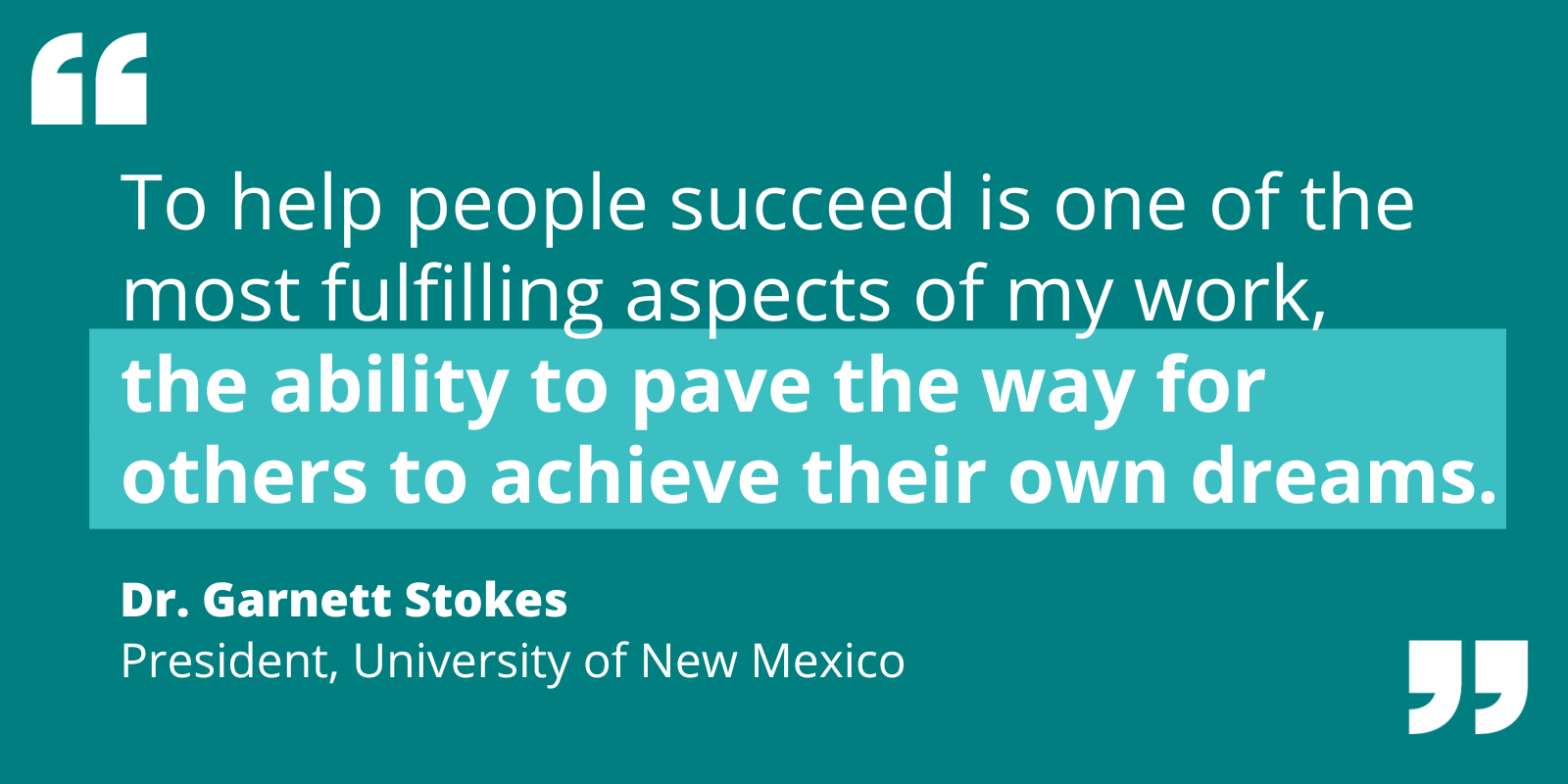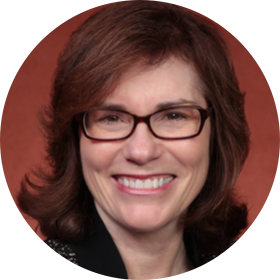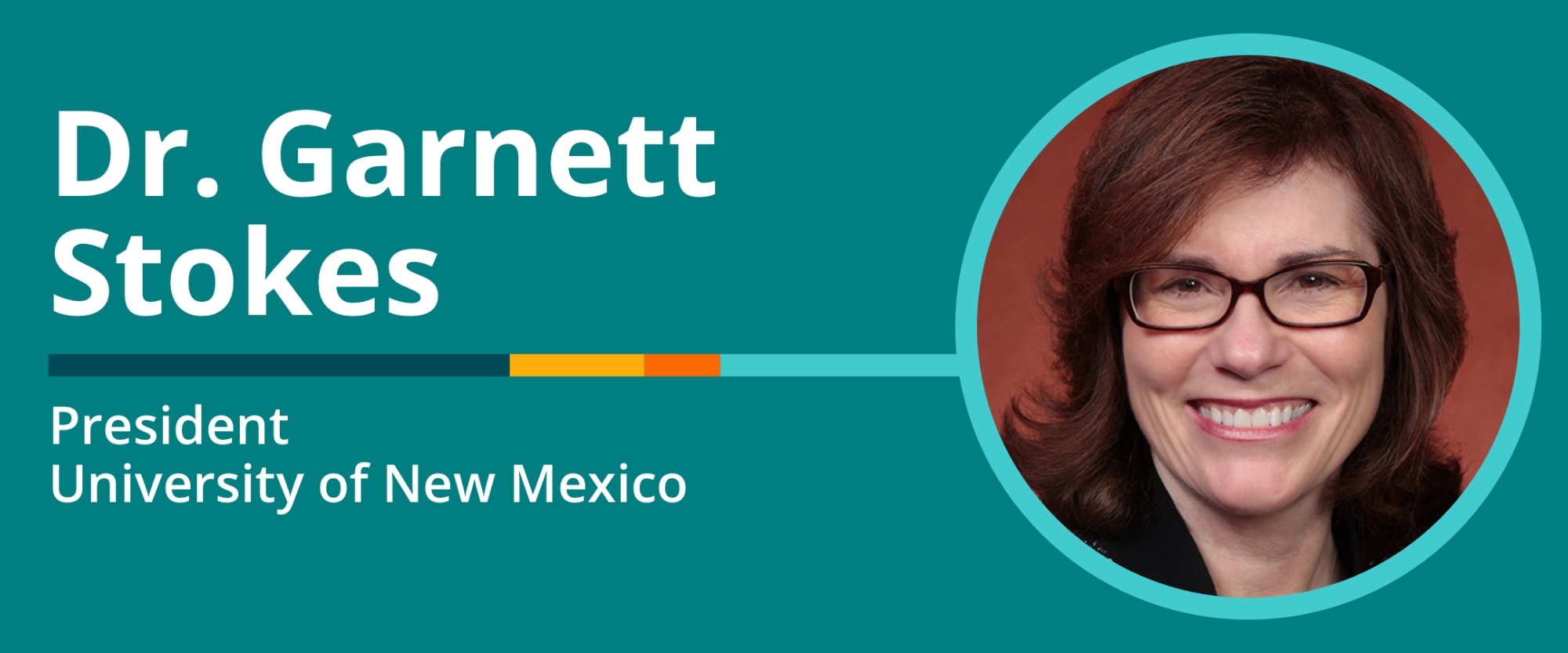The University Innovation Alliance (UIA) values the perspective of higher education leaders, especially leadership experts like Dr. Garnett Stokes, President at University of New Mexico. She joined us on the Weekly Wisdom Podcast to talk about the mindset of accepting new leadership challenges, the responsibilities of institutional leaders as employers, required skills for effective leadership, and navigating the small world of higher ed.
Embracing Leadership Opportunities
From department chair to interim chancellor, President Stokes served in leadership positions at three institutions before joining UNM. We asked how she’s met these opportunities:
“When I think about my role as Provost at Florida State University, at that point in my career, I was not at all certain that I wanted to be a university president. But when the person who had hired me was leaving, I saw it as an opportunity to understand what it means to be where the buck stops in terms of decisions. Florida State had a lot going on at that time. It was amazing to step in and have so much hit you all at once, but I felt like I had been there long enough to provide the stability the institution needed. I think that's what they were looking for when they named me as interim president. Serving as interim gave me perspectives that I wouldn't have had as provost, and I believed that it would strengthen my ability to serve higher education.”
Her leadership experiences at Florida State inspired her to seek opportunities to serve and grow at other institutions:
“I spent several months in that interim presidency, faced a lot of challenges, but also enjoyed the external work with donors and alumni. When I left for a provost job at University of Missouri, I was excited about a new opportunity at a Midwestern university. I had spent my career in the Southeast, so obviously I didn't jump immediately to a presidency, but at Missouri that I decided that yes, I would like to pursue a presidency. Having experience and facing a number of issues at two institutions led me to think, ‘If I can get myself through this, I can certainly do a presidency.’ I think when people are planning to take on leadership roles, the decision to go to different institutions can be part of the growth that allows you to be more successful.”
Initially unfamiliar with the world of higher ed, President Stokes admitted that her leadership trajectory was unexpected:
“I'm a first-generation student. My parents had high school degrees but didn't talk much about college. Every step of the way, something pushed me to decide to go to college, to become a faculty member. Often it was circumstances in my life, or at later stages it was guidance. For example, a colleague and mentor at the University of Georgia told me, ‘You're going to be the next head of psychology here.’ ‘Really? I hadn't thought about it.’ So, when I look back, I realize that my entire career is the surprise.”
Higher Ed Leadership Styles and Skills
Educational institutions serve student bodies, regional communities, and areas of research. In addition, President Stokes reminded us that higher ed leaders are also employers:
“Across the country, things have been upended by the pandemic. People have different expectations now for what it means to work on campus, and many are still struggling from the aftermath of COVID. There are a lot more behavioral and mental health issues, a lot more concerns about isolation. We intended to start this earlier, but COVID came, and it got put off. Now we’re trying to measure and understand how our faculty and staff are engaged. Because without knowing a baseline, it's hard to know where to go from there. We've done engagement surveys with the intention of intervening to help our faculty and staff feel good about where they are, feel productive, and recognize their impact and how much we value them. The struggle is communicating people's value, and it's no surprise that one of the biggest factors that influences how people feel about their work is what is the supervisory relationship? Having the resources to make sure that we are helping supervisors know how to better serve as leaders takes intensive work. We don't necessarily do a great job training people how to lead, yet its importance in the institution goes down to every level of the organization.”
We at the UIA have noticed that putting talented researchers and academics in unsupported leadership positions often wastes their potential by assigning tasks outside their zone of genius. President Stokes assured us that management needn’t be a bad thing:
“Some people do enjoy it. That's what attracted me. But I know in academia, management is considered the dark side. They still talk about the dark side when one is willing to take on leadership roles. But I, frankly, found it rewarding to help people succeed. That's what leaders can do. It's one of the most fulfilling aspects of my work, the ability to pave the way for other people to get things out of their way or get them the resources to help them achieve their own dreams.”

Presidential Authenticity and Expertise
With a background in industrial organizational psychology, President Stokes is one of higher ed’s experts on the science of institutional leadership. For example, she discussed the problematic nature of authenticity:
“When I think about authenticity, I think about trying to bring my full self to conversations with people, whether it's in a group or talking to individuals. But I do realize that there are limitations to information that you share, and I've had to learn how much to share in conversations, in public, etc. This is perhaps more complex than most people realize.
“I was a faculty member in a graduate program where I had a colleague, Karl Kuhnert, who studied leadership. One of the things that I talked to Karl about was authenticity. It's natural for me to be authentic, but our conversations led me to think more about how important that was. And over time, I've learned something from every leader that I've ever worked with, whether it was the program chair, the department head, the dean, and then later as I watched college presidents at my own institutions and elsewhere. There are things you learn to do and the things you learn, ‘I'm glad I didn't have to learn that lesson myself.’”
By this point in her career, her understanding of workplace dynamics infuses her entire approach to what she does:
“Sometimes you don't realize where expertise is coming from. Once you have it, it's just the way you operate. I don't always realize the extent to which my background leads me to look at a university and its organization in the way that I do. My focus really is on creating success in the organization and building workplaces where people can thrive. My dissertation was on life, work, and non-work satisfaction, so thinking about people's lives and wanting them to be successful at work has mattered to me for a long time. And I realize it does lead to certain approaches to higher education.”
How to Thrive in the Small World of Higher Ed
In the culture of higher ed leadership, advice and mentoring are among the most important gifts given and received. President Stokes shared the best advice she’s ever received:
“As an assistant professor, I had a graduate student who at the last moment was asked to teach a class just as he was about to take his preliminary exams. And I got fired up, went to the person who made the assignment, and let them know my displeasure. My department head took me aside and said, ‘You know, there are better ways to get things done and convey something.’ And I think that was an early and important lesson for me that yes, things happen, but how you handle them really matters. Other advice I've gotten is to leave options open. The world of higher ed is small and people don't forget.”
In this spirit, she often tells her graduate students and the aspiring leaders she knows:
“Burning bridges can be harmful to one's career. Those relationships that you don't cultivate or those conflicts that you don't manage well can come back to bite you later. I will talk about that small world, the importance of demonstrating your integrity, being honest with people and not hiding your motives, explaining the decisions you make, and maintaining relationships even when they are by their nature and structure rocky and competitive. In my career, what's been most important is trying to figure out strategies for getting the work done. Every leader has their own issues that they need to work on to be more effective. Some things come naturally, some things don't. I think it's really about figuring out the things that each person needs to work on.”
Note: This interview in the Weekly Wisdom Series originally aired on October 30, 2023 as part of the University Innovation Alliance’s Innovating Together Podcast, appearing live on Facebook, Twitter, and LinkedIn.
Links Mentioned in This Episode
• University Innovation Alliance
• Dr. Garnett Stokes
• University of New Mexico
• Weekly Wisdom Podcast
• Florida State University
• University of Missouri
• University of Georgia
• Karl Kuhnert (Chair of the Industrial-Organizational Psychology Program in the University of Georgia’s Psychology Department, and a colleague of President Stokes during her tenure at that institution)
Bios of Guest and Co-Hosts

Guest: Garnett Stokes, President, University of New Mexico
Dr. Garnett S. Stokes became the 23rd president of The University of New Mexico (UNM) on May 12, 2018, the first woman to hold that office. She set the tone of her administration with a statewide listening tour to frame her presidential priorities of promoting campus safety, supporting student veterans, and advancing UNM’s mission as an R1 university. In keeping with her career-long commitment to building outstanding leadership teams dedicated to student success, President Stokes has recruit diverse and talented leaders nationwide. Since her arrival, UNM has received the prestigious Carnegie Community Engagement Classification, and its student body includes one of the highest number of Fulbright awardees in the country. Her 2019 UNM Grand Challenges initiative harnessed the system’s resources to focus on finding solutions in three key areas: Sustainable Water Resources, Successful Aging, and Substance Use Disorders. Grand Challenges teams have generated more than $20 million in funding and continue implementing education and community outreach throughout New Mexico. Prior to joining UNM, Dr. Stokes served as interim chancellor, provost, and executive vice chancellor for academic affairs at the University of Missouri; and as provost and executive vice president for academic affairs and interim president at Florida State University. She has also been a long-time faculty member, chair of the department of psychology, and dean of the Franklin College of Arts and Sciences at the University of Georgia. A first-generation college graduate, she earned her B.A. in psychology from Carson-Newman College in Jefferson City, Tennessee, and her M.S. and Ph.D. from the University of Georgia in industrial/organizational psychology. She is married to Dr. Jeff Younggren, is a forensic psychologist and retired U.S. Army Colonel. They have two children and four grandchildren.

Co-Host: Bridget Burns, Executive Director, University Innovation Alliance
Dr. Bridget Burns is the founding Executive Director of the University Innovation Alliance (UIA). For the past decade, she has advised university presidents, system chancellors, and state and federal policy leaders on strategies to expand access to higher education, address costs, and promote completion for students of all backgrounds. The UIA was developed during Bridget’s tenure as an American Council on Education (ACE) Fellowship at Arizona State University. She held multiple roles within the Oregon University System, including serving as Chief of Staff and Senior Policy Advisor, where she won the national award for innovation in higher education government relations. She was a National Associate for the National Center for Public Policy and Higher Education, and has served on several statewide governing boards including ones governing higher education institutions, financial aid policy, and policy areas impacting children and families.

Co-Host: Doug Lederman, Editor and Co-Founder, Inside Higher Ed
Doug Lederman is editor and co-founder of Inside Higher Ed. With Scott Jaschik, he leads the site's editorial operations, overseeing news content, opinion pieces, career advice, blogs and other features. Doug speaks widely about higher education, including on C-Span and National Public Radio and at meetings and on campuses around the country. His work has appeared in The New York Times and USA Today, among other publications. Doug was managing editor of The Chronicle of Higher Education from 1999 to 2003, after working at The Chronicle since 1986 in a variety of roles. He has won three National Awards for Education Reporting from the Education Writers Association, including one for a 2009 series of Inside Higher Ed articles on college rankings. He began his career as a news clerk at The New York Times. He grew up in Shaker Heights, Ohio, and graduated in 1984 from Princeton University. Doug and his wife, Kate Scharff, live in Bethesda, MD.
About Weekly Wisdom
Weekly Wisdom is an event series that happens live on Facebook, Twitter, and LinkedIn. It also becomes a podcast episode. Every week, we join forces with Inside Higher Ed and talk with a sitting college president or chancellor about how they're specifically navigating the challenges of this moment. These conversations will be filled with practicable things you can do right now by unpacking how and why college leaders are making decisions within higher education. Hopefully, these episodes will also leave you with a sense of optimism and a bit of inspiration.
Rate, Review & Subscribe
Learn why hundreds of people have rated this new podcast 5 stars! Please join others and rate and review this podcast. This helps us reach and inform more people -- like you -- to help increase the number and diversity of college graduates in the United States.
Click here, scroll to the bottom, tap to rate with five stars, and select “Write a Review.” Then be sure to let us know what you loved most about the episode! Also, if you haven’t done so already, subscribe to the podcast. We’ll be adding a bunch of bonus episodes to the feed and, if you’re not subscribed, there’s a good chance you’ll miss out.

